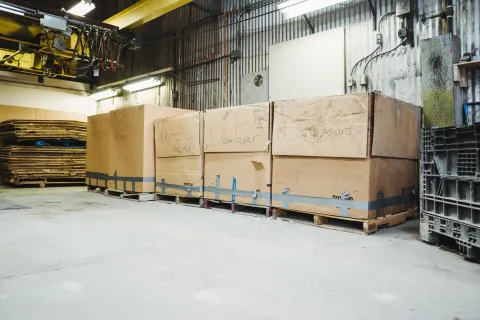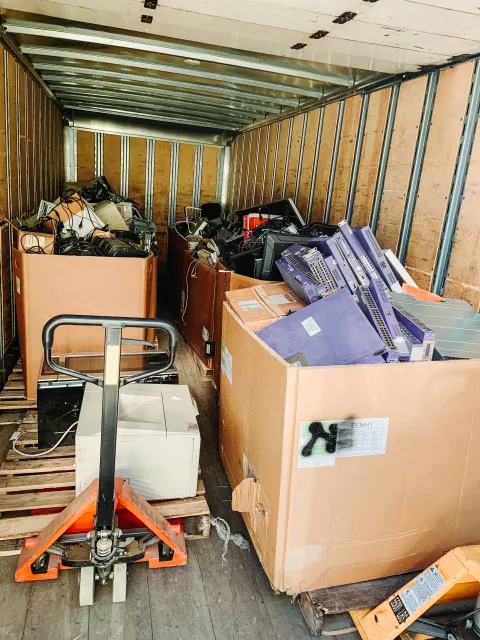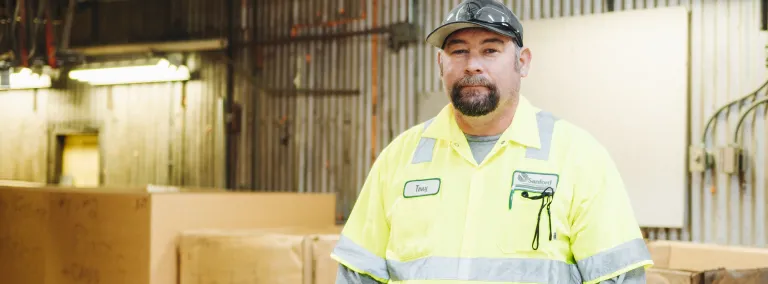SURF’s environmental responsibilities include large recycling effort
Tony Dargatz takes on the recycling effort at SURF
In the past eleven months, the Sanford Underground Research Facility (SURF) has recycled 21,780 pounds of plastics, paper and cardboard and 5,900 pounds of electronics. It’s a big undertaking—one that Tony Dargatz has been heading up since he joined the SURF team in 2019.
Dargatz says he’s never sure what his workday may look like, as he often helps with facility projects—from snow removal to maintaining storm water collection basins to quarterly vehicle inspections—but a large part of every workday is dedicated to the recycling program.
“I always say, ‘whatever I can do for the betterment of SURF,’ and people laugh because they think I’m being smart,” Dargatz said. “But really, that’s what it is. That’s what our team is here for—to help make the world go ‘round up here.”
With major construction, science and maintenance projects unfolding across the facility, SURF’s comprehensive waste management program is committed to diverting as much waste from the landfill as possible.
“We try to reduce, reuse, donate and recycle as much as we can to eliminate the volume of material that would be transferred to our local landfill,” said Timm Comer, environmental manager at SURF, who oversees the waste management program.
Recycling from across the facility
SURF’s recycling program handles typical recyclables, like plastics, paper and cardboard. But it also processes a menagerie of materials from projects around the facility: scrap steel from the Yates Shaft top-down maintenance program; antifreeze and used oil from maintenance vehicles; compressed gas cylinders from science cryogenics systems; freon from air conditioners and refrigerators, just to name a few.

Dargatz collects recyclables from across the SURF campus, sorts the materials, then either hauls them to nearby recycling centers or readies them for pickup. “These centers spend a lot of time and manpower sorting materials before they can be processed,” Dargatz said. “When they see us arrive with everything already sorted, well, we’re on their good list.”
In a large effort this October, Dargatz coordinated the recycling of nearly 3 tons of electronics. The materials, which had been accumulating for several years, included old printers, laptops and phones. Dargatz sorted the electronics and readied them for pickup. “When the truck showed up, it was an effort to get it all to fit!” Dargatz said.

Once delivered to the recycling facility in Sioux Falls, the electronics were dismantled, the microchips were shredded, and the components were recycled for future use.
The program also worked with a company to recycle 1,000 gallons of oil from mobile equipment and the hoists this year.
With such a wide assortment of recyclable materials, SURF works with multiple companies to recycle and process materials The majority of those companies are in South Dakota.
Responsibly managing waste
The waste management program also processes hazardous wastes that cannot be reused, recycled, donated or sent to the uncertified landfill. Such items include certain used batteries, light fixtures, un-punctured aerosol cans and compressed gas cylinders. SURF’s Environment, Safety and Health (ESH) department tracks the processing of any hazardous wastes, even once they are handed over to companies permitted by the Environmental Protection Agency, to ensure they are processed at approved facilities safely.
To limit non-recyclable, hazardous wastes, SURF’s ESH department closely vets all materials and chemicals that are brought onsite in the first place.
“Products go through a review process from both a safety and environmental prospective for potential hazards associated with the use of the product at SURF,” Comer said. “We may recommend alternative products or limit the amount of the product brought on site.”
All hands on deck
Although Dargatz undertakes the day-to-day recycling efforts, everyone onsite can help make the program a success. Small acts, like placing materials in the correct receptacles and breaking down cardboard boxes, go a long way.
“The most important part of the entire program is to make sure materials to be recycled are placed in the appropriate receptacles,” Comer said. “Recycling facilities are very particular about receiving material and there are some that could and will reject a load if non-recycling material is included in the receptacle.”

Healthy workplace, healthy community
SURF’s comprehensive waste management program is just one piece of SURF’s commitment to a safe and healthy environment. SURF operates the Wastewater Treatment Plant to treat water pumped from the deep levels of the facility, monitors the health of nearby streams, tracks air quality above and below ground and trains all employees to understand their individual roles in supporting environmental compliance and safety at SURF.
“Waste management activities at SURF are an important part of the ESH program and will continue to be valuable component of SURF’s environmental stewardship efforts in the State of South Dakota,” Comer said.
“For me, it’s about being a good neighbor,” Dargatz said. “That’s why we do our best with all these projects, to help SURF move forward and to be a good neighbor in this community.”
